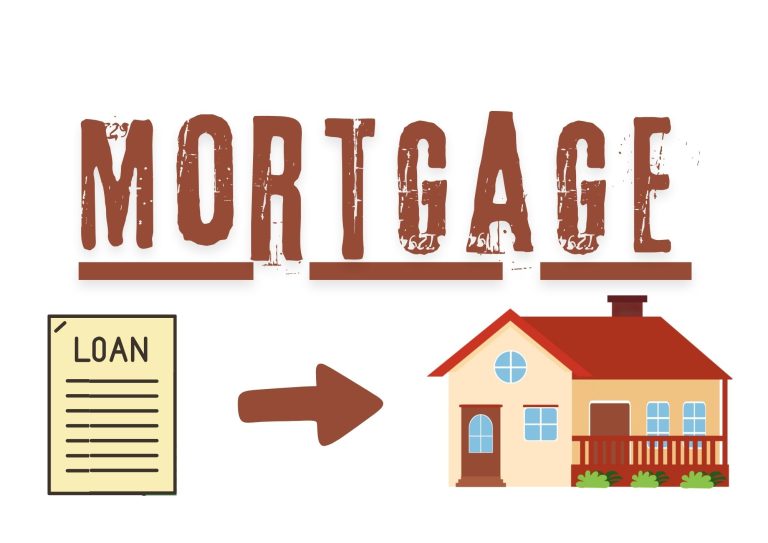A mortgage is loan that allows people and families to purchase, construct or maintain a home. You can also buy a plot of land, or other types of real estate using a mortgage. This arrangement involves a borrower and a lender such as a bank. The borrower receives money to buy a house and agrees to pay it back with interest over some time. The property is the collateral of the loan.
Mortgages enable individuals to fulfill their goal of owning a home.Understanding mortgages is important when making decisions related to housing. This knowledge provides insights into how mortgages impact the real estate market as well as investment opportunities and the financial stability of borrowers and lenders .
This article talks about mortgages including the various types , advantages and potential problems . It will provide information to help you make a knowledgeable decision. Understanding mortgages is important being for financially savvy and a responsible homeowner .
Advantages of taking out a mortgage to buy a house
The first benefit of owning a home is that you will have a place to live. Owning a home provides security and the feeling of belonging.You can customize your living space and make it safe for your family. Homeownership can help you make strong connections with your community .
Ownership potential. The part of your home’s worth that you possess is known as equity. As time passes, grows equity the when value of your property rises and loan your amount decreases .
Owning a house has tax advantages . who People own homes can reduce the amount of taxes they have pay to by deducting mortgage interest and property taxes. These deductions can result in substantial savings each year.
Real estate is a wise choice for investing in the future because properties typically appreciate in value. Buying a house is a way to make a long-financial term investment that can generate profits when you sell it or leave it as an inheritance for your family.

Possible Dangers of Mortgages
There is a significant financial responsibility. If you fail to make mortgage payments you may incur penalties fees and harm to your credit rating.
Having a poor credit score can make it challenging to secure loans or credit later on. It might take a considerable amount of time to repair your credit after experiencing this problem.
Feeling overwhelmed and anxious.Going through the possibility of losing your house in a foreclosure can cause a lot of emotional and mental strain .The uncertainty and chaos with associated this situation have can a major impact on you and your loved ones.
Being threatened with foreclosure is a difficult and disruptive legal process . Lenders may resort to legal measures to retrieve their money seizing by and selling your property.As a result you may lose your home and all the assets you have invested in it .
Consider these factors before choosing a mortgage a for house
Interest rates
This is the amount that a lender charges for borrowing money. These rates impact both the monthly payments and the duration of a loan .They are determined by market conditions the state of the economy and government regulations. Mortgages can have fixed adjustable or interest rates. Fixed-rate mortgages provide stability while adjustable-rate mortgages begin with a fixed rate but may fluctuate later on. All these elements play a role in determining the overall cost of a mortgage.
Duration of Payment
This refers to how long you will be making monthly payments on your mortgage .Typical loan lengths are 15 , 20,and 30 years. Shorter loan terms such as less than 15 years ,mean higher monthly payments less but interest charges. Conversely longer repayment periods like 30 years result in lower monthly payments but higher interest costs.
Suggestions for home loan
Ensure you pay your mortgage on time. Make it a top priority in your budget. Consider setting up automatic payments and think about making bi-weekly payments to avoid late fees maintain your credit score and lower the chances of losing your home to foreclosure.
Consider different choices for refinancing your mortgage. This can involve lowering interest rates shortening the loan term or looking into cash-out refinancing. Decreasing interest rates can lead to lower monthly payments and reduced overall expenses interest. Shortening the loan term can help you accumulate equity more and quickly cut down on interest payments. With cash-out refinancing you can borrow money against your home’s equity for other expenses.
Understand how Escrow Accounts work. These accounts combine payments for property taxes and homeowner’s insurance with your monthly mortgage payment. The payments are made through the escrow account. Stay updated by checking annual statements to ensure account the is being used correctly . Keep an eye on any changes in property taxes and insurance premiums as they can impact the amount you need to pay.
Errors many people make when getting a mortgage and ways to prevent them
1. Not thinking about your future financial goals and plans .Consider what you want to achieve financially in the future . Whether it’s saving for retirement funding education , or starting a business. sure Make your mortgage fits with these goals .
2 . Failing to take the time to look for the best prices:
This means not checking and comparing prices to find the most affordable option for you what want to buy.It’s important to compare offers from various lenders,such as regular banks , credit unions, and online mortgage providers.
3. Taking out a loan that you cannot afford to repay.
Analyze your financial status diligently. Reviewing your earnings spending and current liabilities. Think about how secure your job is and how reliable your income is. Create a financial plan that outlines your budget for mortgage payments and other financial goals. Your mortgage payment should not exceed 28% of your monthly income. Borrow only what you are okay with. If you don’t need the full approved amount by lenders don’t borrow it.
4. Conditions of the home loan agreement. Understand the specifics of your mortgage, specifically the duration of the loan. If the loan term is shorter you will need to make higher monthly payments, but you will gain equity quicker. Conversely, a longer term loan might mean lower monthly payments but could result in paying more overall.
Different lenders offer different interest rates so it’s worthwhile to compare. A small decrease in the interest rate can lead to savings significant throughout the duration of loan the.
5. Get advice from a financial professional. Talk to a financial advisor for expert help with mortgages and planning for your future finances. They can provide tailored advice that suits your goals.
In summary, search for a mortgage that suits your financial circumstances and long-term objectives by exploring various mortgage options.
Conclusion
Mortgages can make your dream of owning a home come true but also they come with financial responsibilities. It’s important to carefully read and understand the terms and conditions of your mortgage. Make smart choices to handle it well. With good knowledge and guidance from experts, you can confidently begin the process of owning a home with a strong financial foundation.


